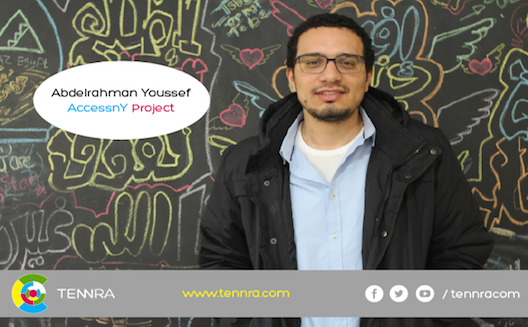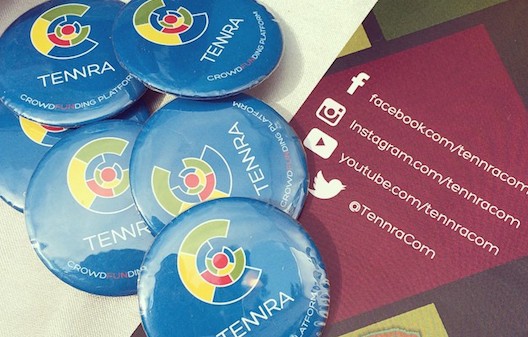New crowdfunding platform takes aim at Egypt's entrepreneurs


Egypt’s latest crowdfunding platform Tennra for entrepreneurs launched this week with a proposition to make giving away money fun.
Founder and CEO Mohamed Ezz ElDin says the gamification concept, where customers “play and pledge” money to specific projects, sprang initially from a desire to be an entrepreneur rather than an engineer, and then to provide a solution to that age-old problem of how small startups access funding.
“What we are trying to do here is trying to create something new in the crowd funding scene,” he told Wamda. “Our bet is that gamification will create the likelihood of the project being more successful than on any other crowd funding platform.”
Tennra combines gaming with a Kickstarter-like model where projects are only funded if they hit their target and users receive incentives for pledging. Donors play games, and instead of sharing a link to a video for a specific project, they share their score on social media. The added bonus is that players who pledge and share the project receive perks from Tennra itself for participating in the process, such as coffee vouchers or discount cards.
The cost for entrepreneurs to use the platform is 7% of the total funds raised, provided they reach their goal, and for that they receive substantial support from Tennra to run the campaign.
“We are educating our market. In order to have a billion dollar market we have to have a lot of people who know what we do. At the end of the day we want the entrepreneurs to be successful, we want people to believe crowd funding works.”
Ezz says they provide guidance on how to create a crowd funding campaign and how to pitch to customers instead of investors; how to manage the financial side so the project won’t be caught out by higher than expected shipping costs or the platform’s fee; they even have a director on hand to help with the videos.
“Tennra as a concept, its core is based on supporting entrepreneurs.”
Abdulrahman Fahim’s startup Accessny is running one of the first two projects on Tennra, and he says that the high level of support was a big reason for using the platform. While he has experience in talking to investors, pitching a crowd funding campaign was totally new to him.
Accessny’s project is an electronic business card. The concept is that a plain plastic card stores the owner's business card details electronically; that data is shared directly into a smartphone by tapping the two together - the same way as contactless payments are made - by using near field communications (NFC) technology. The technology, now included in most new smartphones, is the contactless, short-range wifi-like communication system that is at the heart of Google and Apple’s mobile money wallets.
 Fahim says Accessny is the first company to use NFC technology in Egypt. He’s hoping to raise $1,200 to develop a plastic business card which when tapped on a phone that is NFC-enabled, will transfer the information directly to the phone. The card remains valid for six years, and can be updated by the owner at any time using Accessny software, with updates delivered digitally to recipients.
Fahim says Accessny is the first company to use NFC technology in Egypt. He’s hoping to raise $1,200 to develop a plastic business card which when tapped on a phone that is NFC-enabled, will transfer the information directly to the phone. The card remains valid for six years, and can be updated by the owner at any time using Accessny software, with updates delivered digitally to recipients.
The other project is Rafeya, a five-month-old business that markets clothing designed by founder Noura Gelal and made by women on low incomes in the Haram area in Cairo. Gelal is seeking $1,500 to buy material for the dressmakers.
 Tennra plans to add two new projects by the end of February and currently has a pipeline of 14.
Tennra plans to add two new projects by the end of February and currently has a pipeline of 14.
Ezz says Tennra was originally going to be aimed at social enterprises. The final criteria now demands only that a project is “different and innovative”. Moreover, if the project has a social element it must be run by a startup not an NGO, as Ezz doesn’t want to fall foul of the state’s new regulations around NGO funding.
Tennra joins several other crowdfunding platforms, one of which is also directly aimed at entrepreneurs. Zoomaal is similar to Kickstarter and charges users 5% of their total payments received, while Shekra is a closed network where the ‘crowd’ are investors and the project is an actual business. Bassita targets social causes and awareness campaigns.
Zoomaal is Tennra’s closest competitor in Egypt, but Ezz says the fact that his model includes gaming sets them apart. A pilot in March last year with Robot Khana, which manufactures robots from household garbage, was 120% funded. The key finding was that of the 86 donors and the 18 who played Tennra’s games, eight people who weren’t intending to pledge any money changed their minds after playing a game.
Although Ezz admits this is still a test to see whether gamefied crowd funding can work in Egypt, he’s quietly confident it will. He has plans to expand regionally “very fast” although he doesn’t have a timeline for that yet, and eventually find an investor who’s in sync with his vision.


